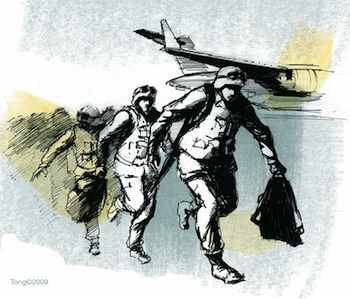- MENU
- HOME
- SEARCH
- WORLD
- MAIN
- AFRICA
- ASIA
- BALKANS
- EUROPE
- LATIN AMERICA
- MIDDLE EAST
- United Kingdom
- United States
- Argentina
- Australia
- Austria
- Benelux
- Brazil
- Canada
- China
- France
- Germany
- Greece
- Hungary
- India
- Indonesia
- Ireland
- Israel
- Italy
- Japan
- Korea
- Mexico
- New Zealand
- Pakistan
- Philippines
- Poland
- Russia
- South Africa
- Spain
- Taiwan
- Turkey
- USA
- BUSINESS
- WEALTH
- STOCKS
- TECH
- HEALTH
- LIFESTYLE
- ENTERTAINMENT
- SPORTS
- RSS
- iHaveNet.com
Jules Witcover

President Obama's decision to attach a ticking clock to his new troop surge in Afghanistan is clearly a gesture to Democratic liberals who have long pushed for an end to the war. The alarm, we're told, is to be set to ring in July of 2011, when U.S. forces will start to pull out.
But immediate testimony on
That is one of the glaring perils in his plan, pleasing to the Republicans, to continue the war -- while promising to his fellow Democrats that it won't be, as in the previous
Former President Bush, through his nearly eight years as a wartime president, declared that the ultimate decision on troops would remain with the generals on the ground, based on conditions that existed at the time. Nothing was said on the Hill immediately after Obama's West Point speech to change that impression.
The timetable for pulling out of Afghanistan seems likely to become even more of a political battleground than Obama's decision to approve the 30,000 troop surge, most of what Gen. Stanley McChrystal sought.
A key answer on how long they will have to stay in Afghanistan is, as in Iraq, in how long it will take to train enough local police and military forces to achieve population security. The Iraqi experience suggests no fast-track solution is in store.
Also as in Iraq, key congressional Democrats argue that setting a timetable for withdrawal of U.S. forces will prod the Afghanistan government to make the reforms required for success in the fight against terrorism, and for internal order. But even now, as the American military effort prepares to segue from Iraq to Afghanistan, the Iraqi parliament continues to wrestle with election reform in advance of scheduled elections next month.
In all this, Secretary of Defense Robert Gates is in an unenviable position on the timetable issue, having served in the same job under the junior Bush, who steadfastly opposed any such ticking clock for troop withdrawal.
Before the congressional Armed Services Committees, Gates acknowledged to Sen. John McCain that if the new strategy wasn't succeeding, the Obama administration would have to reconsider the
The mixed bag of Obama's decision on Afghanistan makes it inevitable there will be assessments of winners and losers. The obvious winner is McChrystal, though he will be getting fewer troops than he sought. The apparently porous nature of the timetable hints at a longer time to achieve his objectives.
Other winners are the
But Biden can be credited with slowing the rushing freight train for the troop surge, causing a more deliberate civilian assessment of the generals' military arguments. And as a loyal member of the Obama team, he can be depended on to support the decision that finally emerged.
As for Obama, this more intensified war in Afghanistan, along with the economic crisis that greeted him on taking office, has brought him a presidency he did not fully anticipate.
Much is at stake for him in gambling that the troop surge, coupled with the short time allotted for demonstrating results, will work. Public patience is wearing ever thinner, and the doubters are already lining up with their nay saying.